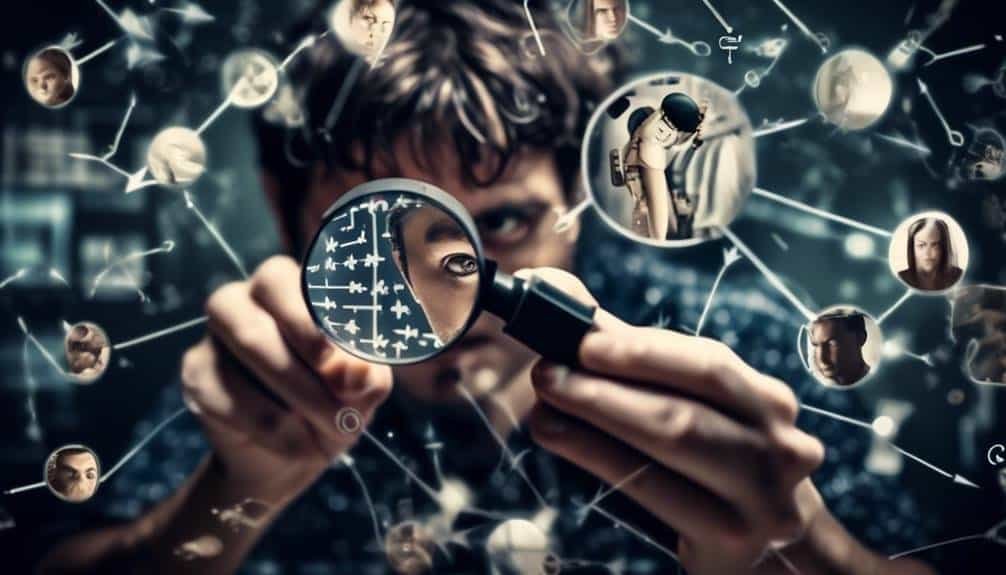Core Critical Thinking Skills
|
Getting your Trinity Audio player ready...
|
The ability to think critically is essential in navigating the complexities of our modern world. It is a skill that is increasingly valued in various professional and personal contexts. Core critical thinking skills encompass a range of cognitive abilities that enable individuals to analyze, evaluate, and conceptualize information in a systematic and logical manner.
From problem identification to decision-making, these skills provide a framework for effective problem-solving and rational decision-making. Understanding and honing these skills not only fosters intellectual growth but also enhances one's capacity for informed and reasoned judgment in diverse situations.
Key Takeaways
- Problem-solving and analysis are fundamental steps in the critical thinking process, requiring a systematic and analytical approach.
- Analysis and interpretation involve a systematic approach using evidence from multiple sources, which helps develop a deeper understanding of complex issues and supports informed decision-making.
- Identifying key elements is crucial for critical analysis and problem-solving as it extracts the most important components from information, facilitates pattern recognition and trend analysis, and uncovers underlying assumptions.
- Exploring different perspectives enhances understanding of issues, contributes to comprehensive analysis and interpretation, and promotes critical reflection.
Problem Identification
Problem identification is a fundamental step in the critical thinking process, requiring a systematic and analytical approach to uncover and define the issues at hand. It involves delving into the root cause of a problem and conducting a comprehensive issue analysis. The identification of problems is crucial in decision-making processes as it sets the stage for developing effective solutions.
To identify the root cause of a problem, critical thinkers must employ various analytical techniques such as root cause analysis, 5 Whys, or fishbone diagrams. These methods help in understanding the underlying reasons that lead to the manifestation of a problem. Additionally, issue analysis involves breaking down the problem into its constituent parts, examining each part to understand its role in the overall issue, and identifying any interrelationships between the different factors.
Furthermore, problem identification is not just about recognizing the existence of a problem but also understanding its scope, impact, and potential consequences. This involves gathering evidence, conducting research, and utilizing critical thinking skills to ensure that the identified problem is accurately defined and understood.
Analysis and Interpretation
Analysis and interpretation are fundamental components of critical thinking. They involve the identification of key elements, exploration of various perspectives, and the drawing of logical conclusions.
These processes require a systematic approach, drawing evidence from multiple sources to support the analysis. By critically examining information and understanding its underlying meaning, individuals can develop a deeper understanding of complex issues and make informed decisions.
Identify Key Elements
Frequently overlooked, the skill of identifying key elements is crucial in the process of critical thinking as it allows for a deeper analysis and interpretation of complex information. This skill is essential for problem-solving and critical analysis.
When identifying key elements, individuals can extract the most important components from a mass of information, enabling them to focus on what truly matters. Key elements serve as the foundation for understanding and addressing issues effectively.
By honing this skill, individuals can streamline their thought processes, identify patterns, and uncover underlying assumptions. Ultimately, this leads to more accurate and insightful analyses, facilitating informed decision-making and the development of effective solutions.
- Enables focused attention on crucial information
- Facilitates pattern recognition and trend analysis
- Helps uncover underlying assumptions
Explore Different Perspectives
Exploring different perspectives is a fundamental component of critical thinking, contributing to a comprehensive analysis and interpretation of complex information. Understanding biases and engaging in critical reflection are crucial aspects of exploring different perspectives. It involves examining how personal, cultural, or societal biases may influence the way information is perceived and interpreted. This process allows for a more nuanced understanding of issues and helps in making well-informed decisions. To illustrate the importance of exploring different perspectives, consider the following table:
| Perspective | Emotion evoked |
|---|---|
| Cultural | Empathy |
| Personal | Sympathy |
| Societal | Understanding |
Draw Logical Conclusions
Utilizing deductive and inductive reasoning, drawing logical conclusions involves systematically analyzing evidence and premises to construct sound and well-supported interpretations.
- Critical reasoning: It is essential to critically evaluate the evidence and premises to draw logical conclusions, ensuring that the interpretations are well-founded and valid.
- Sound judgments: Drawing logical conclusions requires making sound judgments based on the evidence, avoiding fallacies and biases to arrive at reasoned and logical interpretations.
- Rational thinking, deductive reasoning: Rational thinking is crucial in drawing logical conclusions, and employing deductive reasoning helps in forming conclusions that are necessarily true based on the premises.
Drawing logical conclusions is a fundamental aspect of critical thinking, requiring individuals to carefully evaluate evidence and premises to arrive at well-supported interpretations and sound judgments.
Rational thinking and deductive reasoning play vital roles in this process.
Inference and Conclusion
In the context of critical thinking, inference and conclusion are essential components that encompass logical reasoning skills. Drawing logical conclusions and making informed deductions are fundamental to the process of analyzing and interpreting information. These skills allow individuals to arrive at well-founded judgments and decisions. Developing proficiency in inference and conclusion is crucial for cultivating a robust critical thinking skillset.
Logical Reasoning Skills
Developing logical reasoning skills, particularly in the areas of inference and conclusion, is imperative for effective critical thinking. These skills enable individuals to make sound judgments and draw well-founded conclusions based on evidence and critical analysis.
The following are key components of logical reasoning skills:
- Deductive Reasoning: Drawing specific conclusions from general principles.
- Inductive Reasoning: Inferring general principles from specific observations.
- Abductive Reasoning: Forming the most likely explanation based on the information available.
Mastering these reasoning abilities allows individuals to evaluate arguments, detect inconsistencies, and make well-reasoned decisions.
Drawing Logical Conclusions
Mastering the key components of logical reasoning skills, particularly in the areas of inference and conclusion, is essential for cultivating effective critical thinking. Drawing logical conclusions involves critical reasoning and rational decision making based on available evidence. It requires the ability to analyze information, identify patterns, and make sound judgments.
In the process of drawing logical conclusions, individuals assess the validity of arguments and evaluate the strength of evidence to arrive at well-reasoned decisions. This skill is crucial in various aspects of life, including problem-solving, decision-making, and effective communication.
Developing the ability to draw logical conclusions enhances one's capacity to think critically and make informed choices. It is an integral part of honing one's cognitive abilities and forming a basis for rational thinking and decision-making processes.
Making Informed Deductions
What critical thinking strategies can be employed to make informed deductions in the process of inference and conclusion?
When engaging in critical reasoning, it is essential to utilize thoughtful analysis to draw well-founded conclusions. Here are some key strategies for making informed deductions:
- Evidence Evaluation: Carefully assess the quality and relevance of the evidence available to support or refute a particular inference.
- Logical Reasoning: Engage in systematic, logical reasoning to connect the available evidence to the conclusion being drawn.
- Contextual Consideration: Take into account the broader context and potential influences that may impact the validity of the deduction being made.
Evidence Evaluation
The critical evaluation of evidence is a fundamental skill in developing strong critical thinking abilities. Critical examination involves the systematic and logical assessment of evidence to determine its relevance, reliability, and validity.
When evaluating evidence, it is essential to consider the source, credibility, and objectivity of the information presented. The process of evidence evaluation requires an analytical approach, where one must assess the quality of evidence, identify any potential biases, and determine the strength of the argument or claim being supported. Research-oriented techniques such as verifying the accuracy of data, examining the methodology used to gather evidence, and scrutinizing the underlying assumptions are crucial in evidence evaluation.
Additionally, evidence-based reasoning involves the careful consideration of counter-evidence and alternative perspectives to ensure a comprehensive and balanced assessment. Developing the skill of evidence evaluation empowers individuals to make well-informed judgments, draw sound conclusions, and construct persuasive arguments based on reliable and credible evidence.
Ultimately, mastering evidence evaluation is integral to honing one's critical thinking capabilities and fostering a deep understanding of complex issues.
Creative Thinking

Engaging in creative thinking involves the exploration of alternative ideas and the generation of innovative solutions to complex problems. This cognitive process requires individuals to think outside the box, challenge traditional thoughts, and approach issues with fresh perspectives. Creative thinking is an essential component of critical thinking as it enables individuals to devise imaginative brainstorming techniques and develop original concepts. It is a valuable skill in various professional fields, including business, engineering, and the arts.
- Creative thinking fosters the ability to generate innovative solutions to intricate challenges, leading to groundbreaking advancements.
- It encourages individuals to explore unconventional approaches, fostering a culture of innovation and adaptability within organizations.
- Engaging in imaginative brainstorming allows for the cultivation of novel ideas, promoting continuous growth and development.
Research has demonstrated that incorporating creative thinking into problem-solving processes leads to more effective and efficient outcomes. By embracing this skill, individuals can expand their capacity for innovation and contribute to the evolution of their respective fields.
Decision Making
Effective decision making is a critical component of successful leadership and organizational management. It involves the process of making rational choices based on logical reasoning, critical evaluation, and sound judgment. In today's complex and dynamic business environment, leaders are often faced with multifaceted challenges that require swift and effective decision making.
To make informed decisions, leaders need to employ critical thinking skills to assess the available information, identify potential alternatives, and evaluate the potential consequences of each option. Rational decision making involves analyzing the facts and data objectively, without being swayed by emotions or personal biases. Logical reasoning helps in drawing conclusions that are based on evidence and logical deductions, leading to more effective outcomes.
Furthermore, critical evaluation of the available options is essential to ensure that decisions align with organizational goals and values. Sound judgment enables leaders to consider the short-term and long-term impacts of their decisions on the organization, its stakeholders, and the broader business environment. By integrating these core critical thinking skills into the decision-making process, leaders can navigate uncertainty and complexity with greater confidence and effectiveness.
Conclusion
In conclusion, the development of core critical thinking skills is essential for effective problem-solving and decision-making. Through rigorous analysis, interpretation, and evaluation of evidence, individuals can enhance their ability to infer and draw valid conclusions.
Creative thinking further enriches the process, allowing for innovative solutions to complex issues. By honing these skills, individuals can navigate through challenges with confidence and precision, leading to more informed and impactful decision-making.






